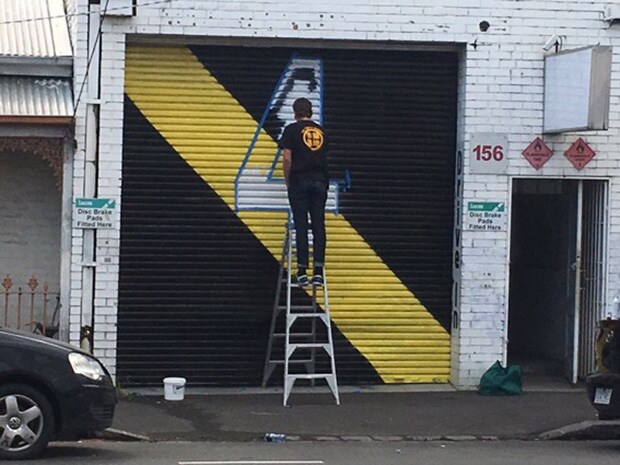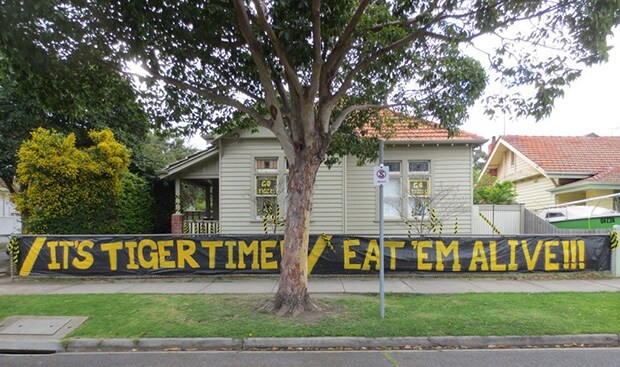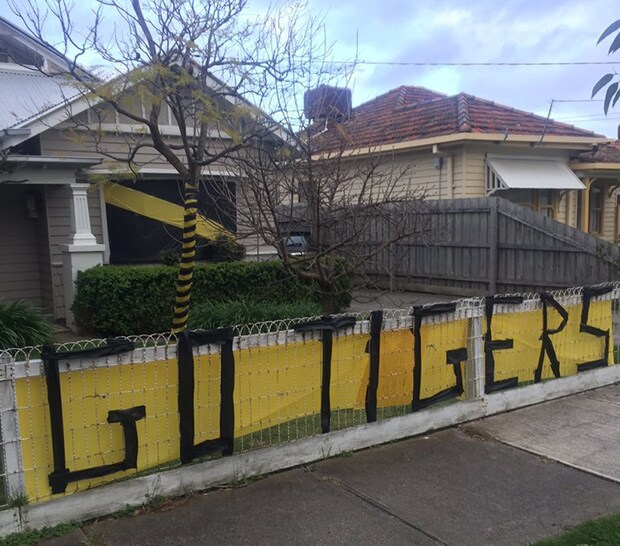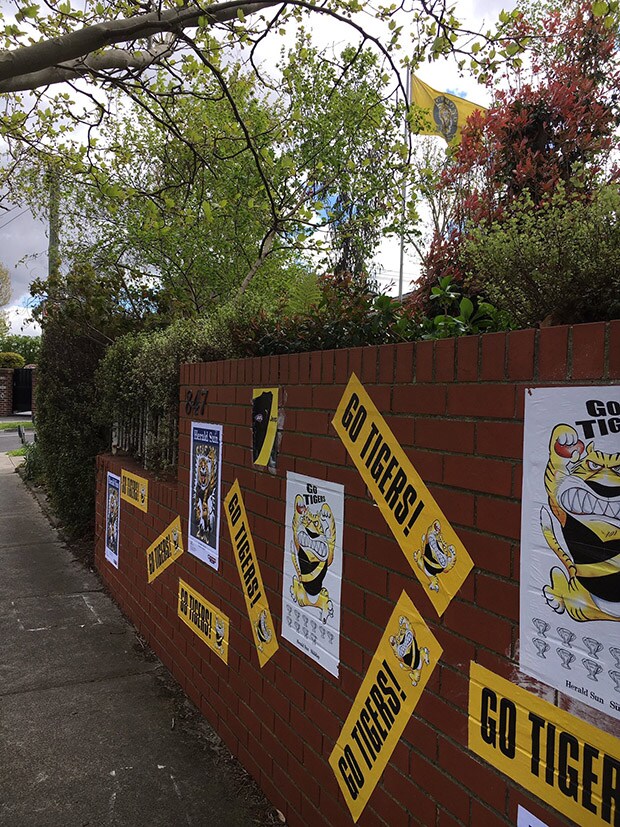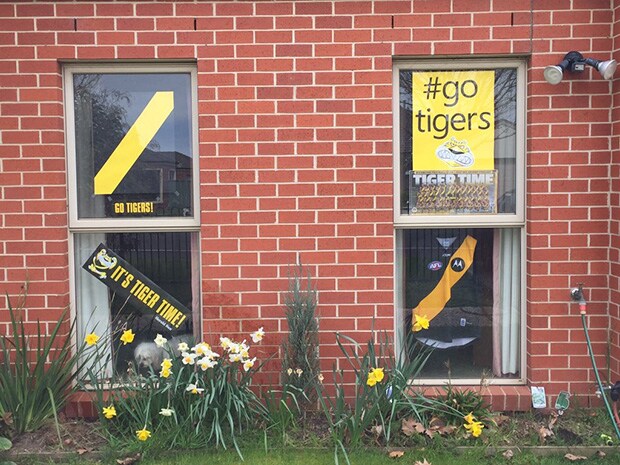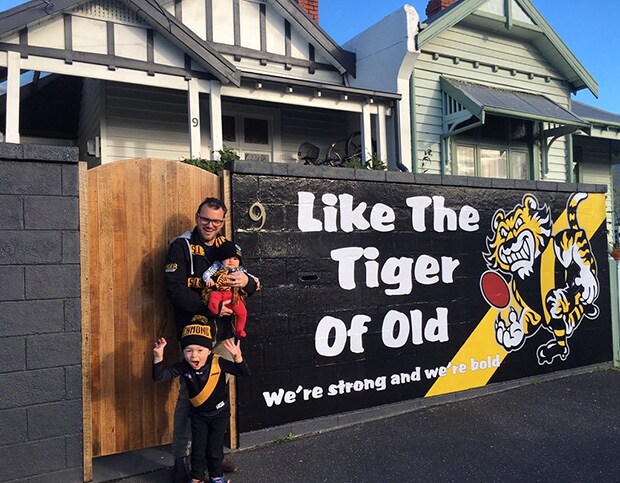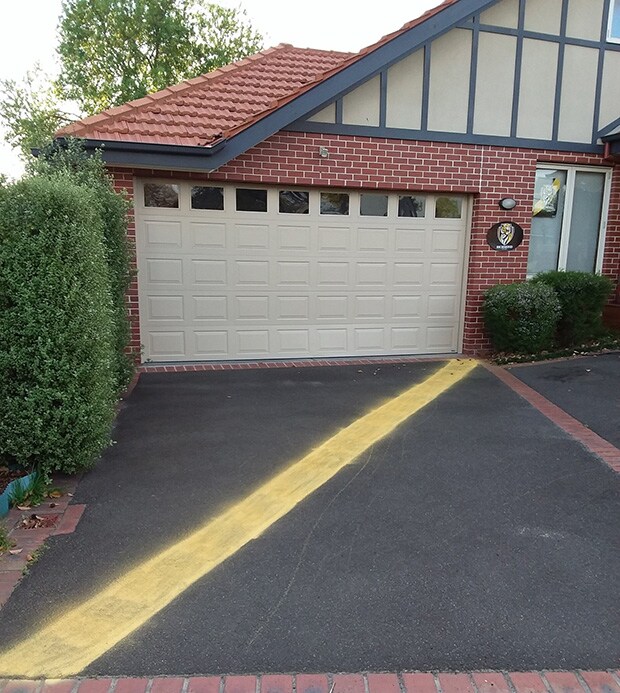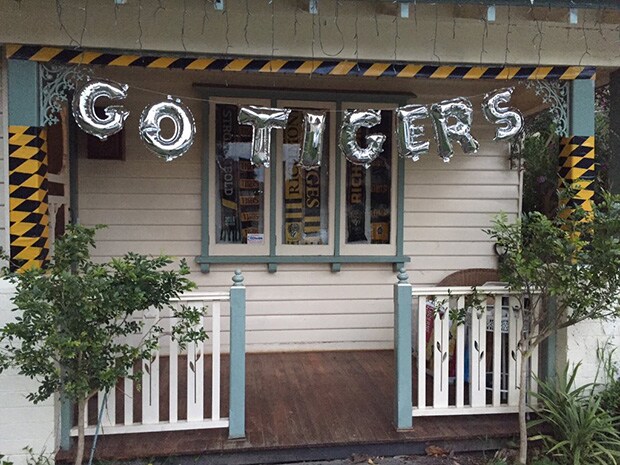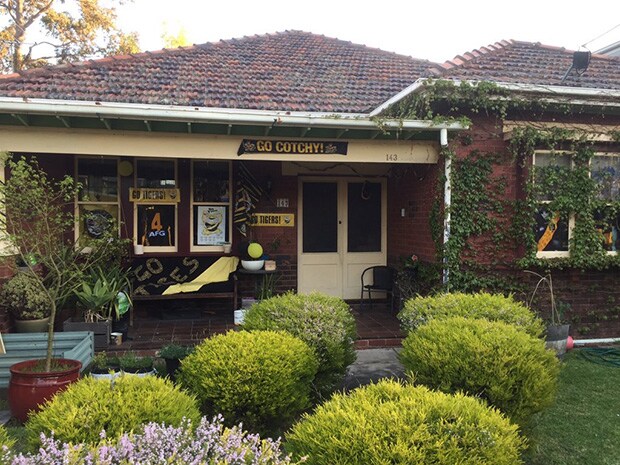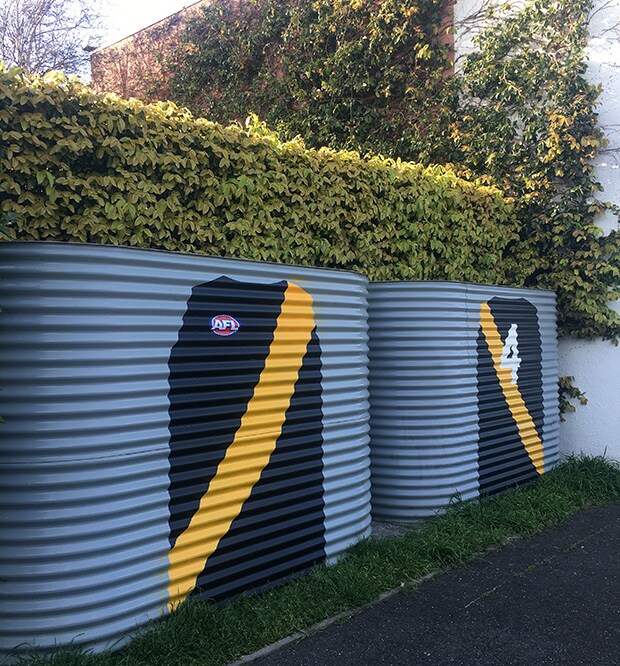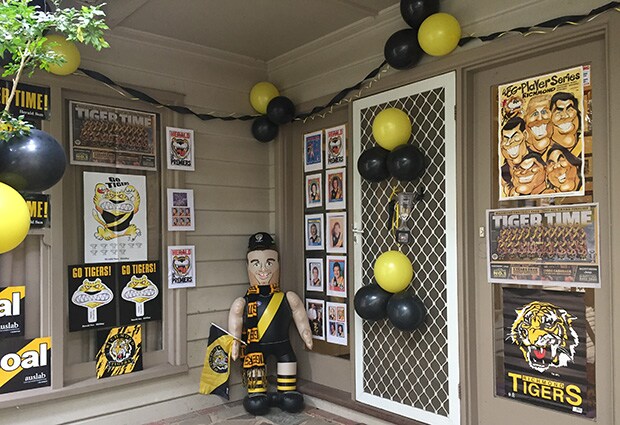It is nearly done now. Close your eyes, think of what may be. One more rest, then deeds that will be remembered forevermore.
Be calm our hearts. Sate our hunger. Still our yearning, for tomorrow the whole city will be looking at us.
A new story will be written, every word for you.
Father and son: Jason and Lenny (in his clash strip) outside their fence in Cotter Street, Richmond.
“He doesn’t understand the game, but he understands he barracks for Richmond, that I barrack for Richmond, that we live in Richmond,” says Jason Mariniello, 41, of his 4-year-old son, Lenny.
“It’s a sense of being part of something. Old Barry who lives around the corner barracks for Richmond, the kids up the road barrack for Richmond. He gets it, and he gets that mum is a Magpie.”
Last Sunday afternoon I called on Jason, a house-painter, the son of Italian migrants (“Mum and dad arrived from Naples, their choice was Carlton, Richmond or Collingwood”), and sitting on the edge of his couch, watched the second half of the VFL Grand Final.
But I was there for his front fence.
Times like these – before a Saturday like this – an urge is to find comfort and in what is known. Hold dear the ones you love, family and friends, people who’ve enriched you, who believe in you. Retreat inwards. Fortitude is sought from within, from those who are close.
Four years ago, on the eve of the Elimination Final against Carlton, Jason Mariniello painted the white palings of his front fence a perfect shade of yellow and black. The following season, when he did it again, I wrote a story about him.
“This year, Lenny and I did it together on Fathers’ Day, after we beat Geelong,” he says.
Jason lives in a weatherboard cottage on Cotter Street in Richmond’s old south ward and says he’s never known the suburb’s tribal heart to beat with such joy. Scarves and flags draped in windows. Jumpers hanging from curtain rods. Ribbons and balloons festooning porches. Yellow-and-black tape and bunting wrapped around lamp posts.
The lowlands of Tigertown, not for the longest time have they been consumed by so much hope, by so many well-wishes.
“A bloke around the corner painted Dusty’s jumper on his two water tanks,” he says.
Air heady with spring blossom, Richmond looking unstoppable, and Jason’s fence is again a local landmark. Children, their fathers, stop to have their photos taken by it. A neighbour from up the street, a Carlton fan with an AFL membership, called him last Sunday morning with an offer. “He just rang up out of the blue asking if I wanted his ticket.”
The answer was yes.
Saturday afternoon is our opportunity of togetherness.
Twenty-two young men, fulfilment, counselled by those who’ve been there before. Dimma, Leppa, Blakey, Balmey. Count the premierships. They know this business, what it takes, the sacrifices made, the calming words, the ways to inspire.
The mountain top is nigh. One last push.
Belief and care for each other is everything.
.jpg)
Prowling tiger: artist Nick Howson in front of his latest addition to the Richmond streetscape.
Last Sunday I also called Nick Howson, an Englishman, an artist, who lives above an upright shopfront on the crest of Swan Street. He’s a Collingwood fan, but a few years back he did something very, very Richmond. Unbidden, he painted a vast mural on a bare concrete wall beside Richmond Station. It’s of a footballer, wearing our colours, floating over chimney stacks and saw-tooth factory roofs and all the foiled ambitions of a hard-luck neighbourhood.
Called ‘Tiger legend’, he told me earlier this year that it was inspired by ‘Captain Blood’.
When we spoke on the phone, as if on cue he’d returned that morning from daubing some new public art in Richmond.
“As soon as they won, I just had to do it,” he says.
A brick wall at an alley’s end, and a sympathetic garbage truck driver (a Richmond fan) screened his shenanigans. A half-hour later it was complete: a spray-painted straight-backed tiger, eyes keen, teeth sharp, on the prowl in Tigerland.
Meeting Nick at the artwork, he talked about the post-match crowds last Saturday night (“absolute mayhem, I’ve never seen anything like it”), the clogged traffic, tooting horns, sing-a-longs, queues snaking around the corner of each pub, of a community rejoicing.
“It was just all this tension released,” he says.
Nick married a Tiger, so intuitively he knows what’s good for him. She’s from a Greek Cypriot family, who lived in Cremorne Street and worked in a nearby textile factory.
“Her father used to know Tommy Hafey.”
He’d love us to win, and says when we do he’ll return to his freshly-painted tiger, adding some silverware.
.jpg)
Crouching tiger, looking to feast on hidden crows
Each club brings its own history, culture, people, its story, to every game it plays.
Ours, for so long, has been one of struggle.
When Richmond joined the Victorian Football League early last century, it customarily held-up the bottom rungs of the ladder. It was the lot also of the neighbourhood, stepped-down to the river, to lowlands perfumed with burning malt, vinegars, chutneys, sauces, preserves, condemned by geography, by factory trades, by a history of being without.
Then, in 1920, came the breakthrough. The boys of Richmond defeated the reigning premiers, their up-river rivals, Collingwood, to claim the cup. ‘PREMIERS AT LAST,’ crowed the headline in the municipality’s weekly newspaper, The Richmond Guardian, in a font size larger than that used to announce Armistice.
Football, it was bigger news than world peace.
Sixty years later, Richmond won its last pennant, also against Collingwood, by a then-record grand final margin, and a Catholic priest pulled ropes under a great spire in the sky after the game, and bells swung and swung, pealing over the city for all to hear.
Richmond, by the grace of God, were premiers again.
**
Wednesday afternoon I bicycled to Lennox Street, scarf dangling from backpack, then to the city’s most-photographed wall this week, the ‘Dusty’ mural on the Rowena Corner Store. An overnight tourist attraction, a modern-day site of pilgrimage, it’s drawing visitors from everywhere.
I oblige an Irishman, taking his portrait, then a Sikh couple from the Punjab, then a family from Wheelers Hill. Then talk with Gina Zouglakis, who I’d arranged to meet.
I wrote about Gina earlier this year, about the milk bar she was born into in Bendigo Street, opposite the redbrick former GTV 9 studios, and the Hellenic diaspora that came to settle in Richmond in the 1960s, making it more Greek than Prahran, Collingwood, Brunswick, Fitzroy, Northcote, than anywhere else in Melbourne.
“I cannot sleep, eat, I’m almost speechless, it’s just so exciting,” she says, of a week that for a generation or two of Tiger supporters has been like no other.
She’s off to the game, by herself, courtesy of a St Kilda friend who offered her AFL membership barcode. And she was there last Saturday in the twilight, in the glorious cacophony, with her cousins who shared the milk bar business with her family.
“After the game, we went for a drink at a pub on Bridge Road, and afterwards we drove down to the old milk bar,” she says.
“It was just lovely. It was about 11 o’clock and we stopped and paid homage.”
Days like these, our hearts return to where it began. Greek parents and a milk bar in Richmond. Family homes. Suburban ovals. Footballers who grew-up in Campbells Creek, in Tatyoon, the Tiwi Islands, Pinjarra, Reservoir, in housing commission flats in Brunswick. It is a spiritual and literal homecoming, with fans coming from far and wide, to be part of this.
All our lives, in some ways, are measured to this Saturday afternoon. A ball will be bounced and time might stand still. Something within us all ends this Saturday, and something else begins anew.
“How exciting, nerve-wracking, exhilarating and magical this is,” writes Kelda Murray from Sydney.
“All the games I’ve ever been to and all the Tiger people I’ve watched them with have been flashing through my mind all week. My grandfather taking me, my household of female university mates going each week, going with my dad and brother, and the pride taking my own family.”
Gina and 'Dusty': "They can do this, they've got this."
Burdens of loss, cast them adrift.
This week we’ve worn our colours with a pride and honour we can hardly remember. All of us have walked taller this week. We’ve painted our fences, strung up balloons, ribbons, decorated our houses, celebrated our loyalty.
All this week we have received nods of approval and solidarity, and all of it is owed to our players.
We adore them.
Tomorrow, come what may, we gather for them.
“They can do this, they’ve got it, they’re going to do it,” says Gina.
“They’ve got the ability and the playing style, and we can beat anyone at the G, at our beloved church of football.”
Saturday is our party and there’s no reason we shouldn’t wake on Sunday morning not quite believing what happened. The hard-knuckle boys from old Struggletown, they won!
